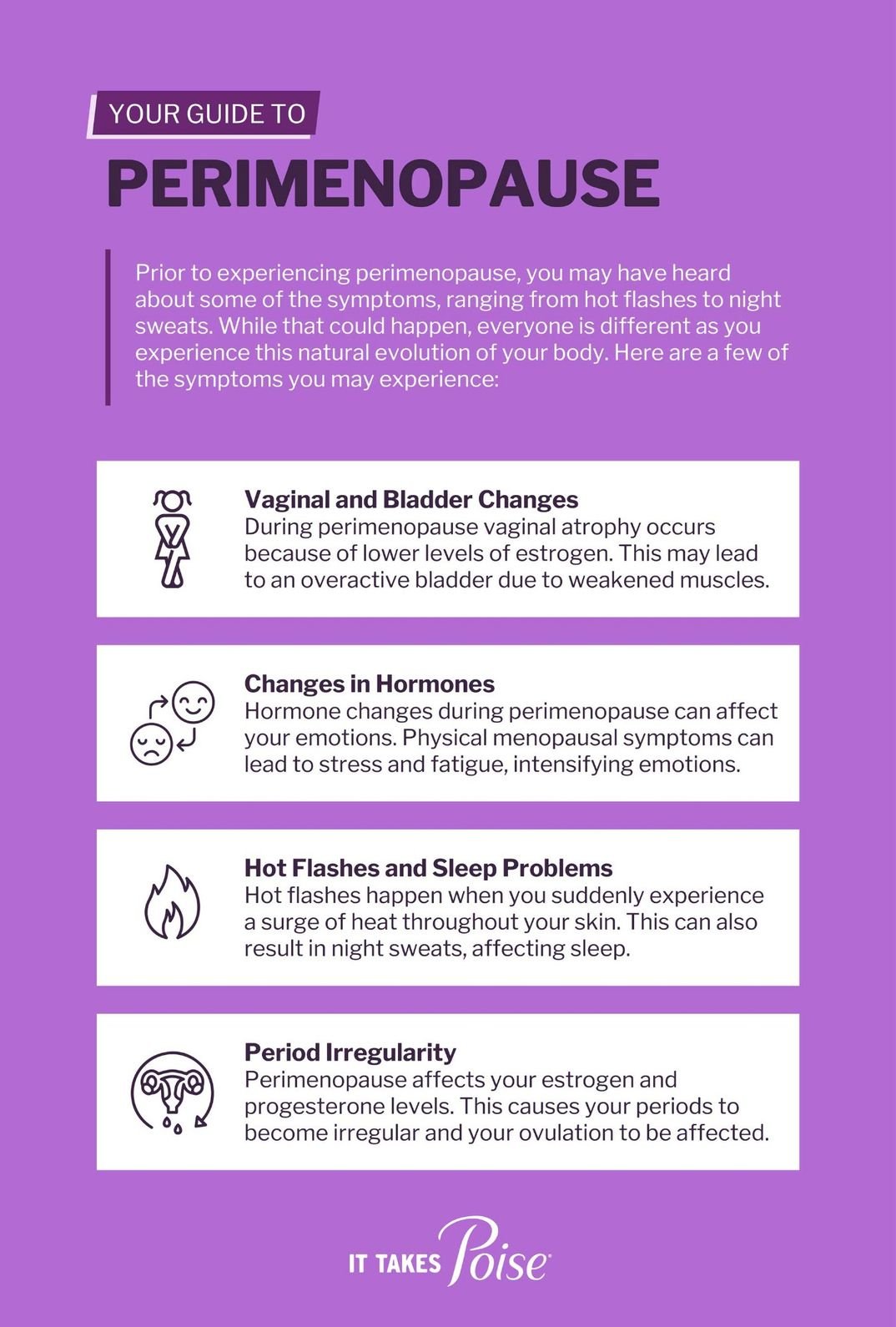Your Guide to Perimenopause
A women’s body goes through an incredible range of changes over the course of their lifetime. From childhood to puberty to motherhood, the body goes through a gamut of cycles and changes, including perimenopause.
Prior to experiencing perimenopause, you may have heard about some of the symptoms, ranging from hot flashes to night sweats. While that could happen, everyone is different as you experience this natural evolution of your body. To help you prepare you for this next chapter, we’re sharing more about what to expect and some techniques to help you to manage your perimenopause symptoms.
What is Perimenopause?
Perimenopause refers to the stage of your physical development when your ovaries gradually stop working and producing estrogen. Thus, perimenopause is the transitional phase leading up to menopause. It can begin as early as your mid-30s or as late as your mid-50s.
This change happens slowly and can last anywhere from two to ten years as your body adjusts to changing hormone levels.
Symptoms of Perimenopause

The change in the release of this hormone will impact different parts of your body and lifestyle such as your sleep patterns, your menstrual cycle, vaginal dryness, and your body’s ability to regulate its temperature, to name a few symptoms.
Changes in Hormones
The changes that occur with your estrogen levels can impact many aspects of your well-being. Declining estrogen levels may lead to changes in your moods and emotions that could sometimes feel like a rollercoaster.
According to Dr Nazanin E Silver of the American College of Obstetricians and Gynecologists,“The hormone changes that affect your periods during perimenopause can affect your emotions, too. Physical menopausal symptoms can lead to stress and fatigue, intensifying emotions.
These mood changes can often feel like PMS where you may feel low energy, irritable, sad, and your ability to focus (aka brain fog). Since these symptoms can come at times not related to your period, their unpredictable nature can leave you feeling emotionally unsettled and even depressed.
You’ll also experience a decline of your fertility. While you may still be able to get pregnant, the lower amounts of estrogen might make it more difficult should you be interested in having a child at this time.
Hot Flashes and Sleep Problems
A common symptom associated with perimenopause; hot flashes happen when you suddenly experience a surge of heat throughout your skin causing you to break out in a sweat. This experience can last anywhere from 30 seconds to five minutes and for some may even cause the skin to turn red.
At night, you may also experience this phenomenon known as night sweats. This might cause you to suddenly wake-up feeling sweaty, sticky, and perhaps uncomfortable or anxious. These sleep disturbances can make it harder to fall asleep again and can become more frequent as you get closer to menopause.
Another aspect affecting your poor sleep during this time is the decreased amount of melatonin released. Research shows that as you age, the pineal gland secretes less of this sleep-regulating hormone (1), making adjusting to this new cycle difficult.
Period Irregularity
Perimenopause affects your estrogen levels and your reproductive system, including your progesterone levels.
The fluctuation of these hormones will cause your periods to become irregular and your ovulation to be affected.
This could cause your periods to become longer or shorter - than usual - as this hormonal fluctuation continues until you eventually reach menopause. It can also cause you to skip periods or spot in between your period.
Vaginal and Bladder Changes
You’ve probably noticed that you’re more sensitive than usual down there. During perimenopause vaginal atrophy occurs because of lower levels of estrogen. These lower levels contribute to the lining of your vagina feeling drier and thinner. This atrophying can also cause discomfort or pain during sex as well as symptoms of itching and burning.
Additionally, these lowered levels of estrogen can also lead to bladder problems as estrogen plays an important role in keeping the bladder muscles strong. Less availability of this hormone means that you’ll develop an overactive bladder due to weakened muscles.
If you are experiencing urinal leakage due to weaker bladder muscles, consider taking our product quiz to find the best products for you. Add day liners such as the Daily Liners For Bladder Leaks by Poise® to your wellness regime. These liners offer an absorb-loc® core that quickly locks away wetness and odor. Additionally, these liners are equipped with a CleanFresh™ Layer that helps keep you fresh and dry.
Complications of Perimenopause
The symptoms you experience during perimenopause can leave you feeling confused, anxious, and uncomfortable. This can include a range of issue in your personal life such as:
- Trouble focusing and short-term memory issues.
- Vaginal dryness and the discomfort of sex might cause problems for your romantic relationship.
- Vaginal dryness and lack of lubrication can lead to increased vaginal infections or UTIs (urinary tract infections).
- The discomfort of the hormonal changes can result in a decreased sex drive.
Managing Perimenopause Symptoms
Management for perimenopause symptoms has progressed over the years where you can now find a variety of options that are both lifestyle and medicinal. This means that even though it can be a confusing and difficult, there are ways to make this journey a little easier.
- Hormone therapy. Your doctor might recommend that you try hormone therapy using either only estrogen or a combination of estrogen and progesterone to balance out your hormone levels. These hormones can come in pill, patch, or cream form and will help relieve your hot flashes and night sweats.
- Antidepressants. One of the most difficult aspects of this transition is its mental toll. Not only are your hormones changing but so is your body and it can be a lot to adjust to. Speak to your doctor if you feel that your mental health has declined, and you need help. Antidepressants also help manage hot flashes if you find that you can’t take hormonal medication.
- Vaginal creams. To help with the lack of lubrication and dryness you’ll experience, using a vaginal cream will ease your discomfort.
- Lifestyle habits. Having a healthy lifestyle including daily physical movement and eating a healthy diet will help you manage your perimenopause symptoms like anxiety, sleep, and hot flashes.
- Tracking your triggers. It could also be helpful to keep track of what triggers your symptoms like hot flashes, whether they’re tea, coffee, or stress, as this will help you understand what to avoid or minimize in your day-to-day life.
Make your Perimenopause Journey Comfortable
Perimenopause can be a stressful, tiring period of your life but understanding how your body changes during this time will help you to better understand your symptoms as well as techniques to bring ease and comfort back into your life.
"This content should not substitute medical advice from your personal healthcare provider. Please consult your healthcare provider for diagnosis or treatment."
Take the first step in understanding your perimenopausal journey by finding the right products that fit your lifestyle.
Recommended Products
Absorbency Level
Absorbency Level








